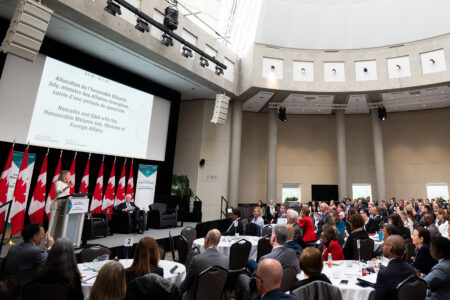
If you’re ever in Western Montreal, you might catch an excellent radio station that has a knack of playing tunes that cause you to turn your radio up. You mightn’t immediately notice that K-103 is run entirely by Mohawks from the Khanawake reserve. You won’t hear traditional Iroquois drumming or native-language discussion. You’ll just get an earful of catchy tunes. And with the exception of the occasional brief station identification, the DJs speak English.
Considering that all but three of Canada’s 50 native languages are considered in danger of extinction—Algonquin, Inuktitut and Athapaskan remain viable—the Mohawks’ choice of English is a daring political statement. Around the world little languages are biting the dust faster than you can hook up a satellite TV dish. Half the world’s languages are either threatened or already extinct; 5,400 languages will be lost in this century. Languages are going extinct faster than dot.com companies. This bothers many academics, who talk of languages as if they were necessary elements of our ecosystem. Like biodiversity, the academics argue, diversity in languages adds to our planetary wealth and enables people to think in original cultural patterns.
Language, they argue, is a sort of kaleidoscope through which we perceive reality. Obscure language speakers evidently have an entirely unique view on cooking french fries, mowing the grass and effective comprehension of badminton rules. I can’t look at a northern villager without expecting him to be able to reel off at least 50 words for snow. And no doubt Asian farmers speak in beautiful, lilting sing-song tongues that include at least a few dozen words for rice. In the same vein, American university professors have started interrupting lectures to scan the room for dark-skinned kids and ask, “What’s the black take on that issue?”
I don’t get it (or nie rozmieją as we say in Cassubian) because as long as we celebrate and encourage linguistic differences, we lessen our communication with each other. Languages may well carry history, but history too often is a war-torn saga of generations of neighbours never getting to know each other simply because they can’t make themselves understood.
There’s a reason people are shunning their native tongues. How many of Canada’s 400 native Tsimshian speakers are making six figures on Bay Street? Are you holding your breath for the first PM who speaks Dogrib? How do Australia’s natives get on the same page when they speak 138 languages? Who’s paying the translator? Does Belarus really need eight languages, France need 19 or Italy 27?
The shrinking language world is generally considered part of the downside of globalization, but in fact some experts argue that our ancestors spoke one common tongue, called Nostratic. Only afterwards did not-so beloved Asturian, Friulian, Trukhmen and Breton accidentally arise. We might feel guilt about these languages’ current decline but it’s a process that took off two centuries ago with efficient transport and Napoleon’s conscription schemes and hasn’t slowed since.
And besides, since when did being able to communicate with other people become a bad thing? A century ago socialists argued that their movement would succeed when workers of the world united under one tongue, as do certain feminists today. Remember Esperanto? The idea of it was universally applauded at the time, but since then universal understanding has become massively politically incorrect. Today the privilege of international communication is largely reserved for the wealthy boarding-school elites, some of whom eventually become linguists with a professional interest in the preservation of obscure tongues.
As an expert said in a recent PBS documentary, “we carry our tradition, we carry our history, the very history of who we are, through our language.” Unfortunately, in the real world of micro-language speakers the “who we are” part is too often backwater peasants who can’t get a job as a linguist or even flipping burgers in the big city. Indeed sentimental academics actually damage those they claim to champion by keeping alive the very languages that are holding them back from increased earning power.
I don’t believe that a culture dies with a language anyway. Indeed in my own home the adult majority expresses itself in Pidgin English from the Caribbean, which sees “it have” replace “there is,” and the third and first person conjugations reversed. If I ask my wife, “Honey, how about an expresso?” She might reply, “nuh-uh, wh’appen, you got poker han’?” (Translation, anyone?)
As Quebec’s own beloved Jacques Villeneuve hinted oh-so-politely in a recent language dust-up, linguistic multiplicity leads to suspicion, prejudice, hatred and conflict. It also economically disadvantages linguistic minorities unable to cope in the big money tongues.
Yes, languages understood by a few dozen are disappearing. Don’t mourn their loss. Instead let’s celebrate the fact that glorious new doors of understanding are being flung open by neighbours as people finally get to talk and understand each other, something our ancestors could never do. Let’s hope the process continues.
We’re all in the same külä, er village—pardon my Ludian—now.
Photo: Shutterstock






